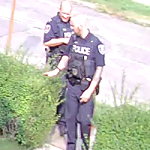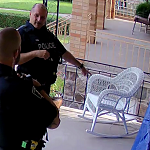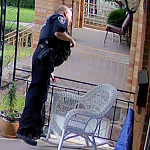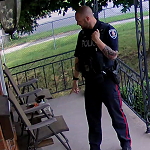Offenders behind a blue wall
Please note: This is a work in progress. Expect to find broken
links and missing pages, copy and paste confusion, etcetera.
In the name of Justice, to Protect and Serve. What do you do when justice is perverted by a criminal personality in a uniform, carrying a gun purchased by the public they ostensibly serve? As it turns out, The Aims of the Criminal Law are more divergent than it would appear from statute alone.
Windsor Police Service Sergeant Steve Betteridge
Particulars
Remarks
-
Developmental competencies evaluation
Please note: This is a work in progress. Expect to find broken links and missing pages, copy and paste confusion, etcetera.
Criterion Officer's Task Assessment Comments information seeking ability to seek out information from various sources before making decisions concern for safety ability to exercise caution in hazardous situations in order to ensure safety of self and others assertiveness ability to use authority confidently and to set and enforce rules appropriately initiative demonstrated ability to be self-motivated and self-directed in identifying and addressing important issues co-operation ability to collaborate with others by seeking their input, encouraging their participation and sharing information negotiation/facilitation ability to influence or persuade others by anticipating and addressing their interests and perspectives work organization ability to develop and maintain systems for organizing information and activities community-service orientation proven commitment to helping or serving others commitment to learning demonstrated pattern of activities which contribute to personal and professional growth organizational awareness understanding the dynamics of organizations, including formal and informal cultures and decision making processes developing others commitment to helping others improve their skills - Associates:
- Mayor of Windsor Drew Dilkens
- Chief of Staff Norma Coleman
- Community safety:
-
Competency evaluation
Please note: This is a work in progress. Expect to find broken links and missing pages, copy and paste confusion, etcetera.
Criterion Officer's Task Assessment Comments analytical thinking ability to analyze situations and events in a logical way, and to organize the parts of a problem in a systematic way self-confidence belief abilities and judgment and a recognition of personal limitations and development needs communication ability to demonstrate effective listening, verbal and written communication skills flexibility/valuing diversity ability to adapt to a variety of situations, and to work effectively with a wide cross-section of the community representing diverse backgrounds, cultures and socio-economic circumstances self-control ability to keep emotions under control and to restrain negative actions when provoked or when working under stressful conditions relationship building ability to develop and maintain a network of contacts, both inside and outside the police service achievement orientation desire for continuous improvement in service or accomplishments medical/physical skills and abilities job-related medical/physical skills and abilities, including vision, hearing, motor skills, cardiovascular endurance and upper-body strength
-
Competency evaluation
Narrative
- March 20, 2012
7:30 P.M. -
CP 2012-16312 - The camera fucker and his yellow bitch
At the time of the occurrence, Constable Paul Brothers was partnered with Constable Kenneth Burt. Sergeant Betteridge was not present.
See: Constable Paul Brothers and Constable Kenneth Burt. - March 20, 2012
10:55 P.M. - Repeat behaviour
At the time of the occurrence, Sergeant Betteridge was not present.
Re: Ashley Simone's dish washer and his friend in a black pickup truck, "You're going down Buddy."
See: Place holder. - March 21, 2012
1:07 A.M. - Heading out
Place holder. - March 21, 2012
1:10 A.M. - Nearly four years in the making, shit finally meets fan
At the time of the occurrence, Sergeant Betteridge was not present. His subordinate on September 23, 2017, Constable Andrew Crossett, responded to it.
Re: Amanda Ann Herba theft/destruction of Olympus PEN E-P1 during an unprovoked assault (in fulfillment of her threat made March 18, 2012)
See: Amanda Ann Herba, Rikki Renee Reid, Stephan Charette, Desiree Chevalier, Peter O'Quinn, Paul Renaud. - March 21, 2012
1:12 A.M. - Diminished return

Place holder.
See: - March 21, 2012
1:13 A.M. - CP/GO 2012-16387 - The Regulators take action
At the time of the occurrence, Sergeant Betteridge was not present. His subordinate on September 23, 2017, Constable Andrew Crossett was partnered with Constable Issam Salame. Acting Sergeant Peter Mombourquette was the officer in charge on scene.
Place holder.
23. Accessory after the fact
343. Robbery, Re: Amanda Ann Herba theft/destruction of Olympus PEN E-P1 during an unprovoked assault (in fulfillment of her threat made March 18, 2012)
Place holder.
See: - March 21, 2012
- CP/GO 2012-16387 - The Man who wasn't there
At the time of the occurrence, Sergeant Betteridge was not present. His subordinate on September 23, 2017, Constable Andrew Crossett was partnered with Constable Issam Salame. Acting Sergeant Peter Mombourquette was the officer in charge on scene.
Re: unnamed witnesses for the Crown Peter O'Quinn and Devon Ure, the group discussion
Place holder.
Section 7
Peter O'Quinn present, discussing the occurrence with other "witnesses" after having chased the victim of Amanda Ann Herba (his partner in welfare fraud)
See: - March 21, 2012
1:21 A.M. - CP/GO 2012-16387 - Waz up?
At the time of the occurrence, Sergeant Betteridge was not present. His subordinate on September 23, 2017, Constable Andrew Crossett was partnered with Constable Issam Salame. Acting Sergeant Peter Mombourquette was the officer in charge on scene.
Place holder.
Section 7
Kelly-Anne Girard entering "secured scene" and coaching Rikki Renee Reid before a statement is made
See: - March 21, 2012
1:52 - 1:58 A.M. - CP/GO 2012-16387 - Place holder
At the time of the occurrence, Acting Sergeant Mombourquette was the officer in charge on scene. He was accompanied by Constable Andrew Crossett.
128.(a) Misconduct of officers executing process
348. Breaking and entering with intent, committing offence or breaking out / 349. Being unlawfully in dwelling-house
MALE WILL BE WANTED FOR ASSAULT. WPS Tracy Klingbyle, 1:24 A.M. (CP 2012-16387)
THIS WILL BE ROBBERY WPS Tracy Klingbyle, 1:30 A.M. (CP 2012-16387)
mens rea: 350.(c) - artifice, re: timeline per WPS records
139.(2) Obstructing justice
137. Fabricating evidence
Place holder.
Section 7
Section 8
conspiring with Khrystye Hamlin after illegal search, complimentary fabricated evidence
Beyond the dwelling house itself, the law recognizes not only property rights but also territorial privacy interests in the land or property on which a private home is situated. In this regard, the courts have observed that “a reasonable, indeed a strong, expectation of privacy” also exists in persons’ “approaches to their homes”: MacDonald, at para. 26; R. v. Evans, [1996] 1 S.C.R. 8 , at para. 21. Accordingly, while there exists at common law an implied licence for persons, including the police, to approach the front door of a dwelling to facilitate communication with an occupant, not for a subsidiary purpose such as to secure evidence (Evans, at paras. 13, 16, 18, 20-1, 24; R. v. Atkinson (2012), 287 C.C.C. (3d) 544 (Ont. C.A.), at paras. 72-7), once the attendee acts outside this limited licence he or she becomes an intruder or trespasser: Evans, at para. 15. R. v. Wilhelm, 2014 ONSC 1637, at para. 103
Section 9
Section 10
R. v. Sinclair, [2010] 2 S.C.R. 310
Section 11
Section 12
Section 15
See: - March 21, 2012
2:13 A.M. - CP/GO 2012-16387 - Place holder
At the time of the occurrence, Acting Sergeant Peter Mombourquette was the officer in charge on scene. Sergeant Betteridge was not present.
Re: Witness arrival, blocking highways, Constable Kristofor Lauzon, Constable Andrew Crossett and Constable Christopher MacIntyre (see: June 19, perjury).
Place holder.
See: - August 13, 2012
- Ontario Court of Justice - Preliminary Hearing
Sergeant Betteridge was not present for these proceedings.
Re: a preliminary hearing into the events of March 21, 2012 is scheduled. As it begins, it is postponed.
See: witnesses for the Crown Amanda Ann Herba, Stephan Charette, Desiree Chevalier, Paul Renaud, Rikki Renee Reid, James Tadet; Debbie Herba, unnamed witness for the Crown Peter O'Quinn, unnamed witness for the Crown Devon Ure, attorney John D. Liddle, assistant Crown attorney Russell Cornett, assistant Crown attorney Jennifer Holmes. - August 18, 2012
- Hoodrat News Network
Place holder.
See: witness for the Crown Rikki Renee Reid, unnamed witness for the Crown Kelly-Anne Girard, Rainier Cloutier, David Fortune. - August 18, 2012
- Burn it down
Place holder.
See: Paul Kevin Harper. - August 18, 2012
- Cirque de la souillé
Place holder. - August 19, 2012
- Who, me?
Place holder. - August 19, 2012
- Cirque de la souillé, anneau deux
Place holder. - August 20, 2012
- CP 2012-51622 - Capuchin and the grinder
At the time of the occurrence, witness for the Crown Andrew Crossett was partnered with unnamed witness for the Crown Michael Robertson. Sergeant Betteridge was not present.
Place holder.
See: Constable Andrew Crossett, Constable Michael Robertson, WPS Tracy Klingbyle, Sergeant Wren Dosant. - September 23, 2016
- CP/GO 2016-69432 - The Royal we
At the time of the occurrence, Constable Andrew Crossett did not have a partner. Sergeant Betteridge was the officer in charge on scene.
Place holder.
Police Services Act R.S.O. 1990
Place holder.




